|
All Our Yesterdays
Twenty-five years ago in my Daily Telegraph column, my two main picks of that month’s bumper crop crime fiction were both prime examples of very black humour. I described Nicholas Blincoe’s Jello Salad as ‘Tarantino goes Trainspotting’ and in particular noted the scene of casual sex in Harvey Nichols. If anything, Colin Bateman’s Empire State was even more brutal, a gloriously over-the-top saga about the hijacking of the eponymous building.
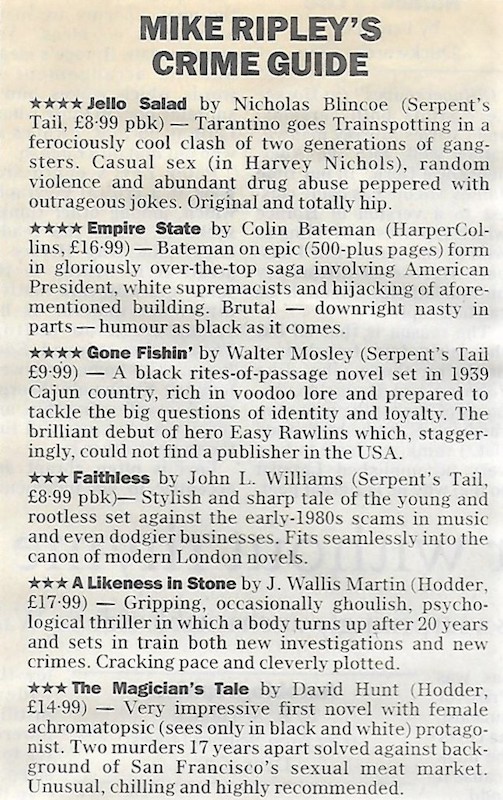
Playing it more seriously, there were sterling contributions in Gone Fishin’ by Walter Mosley, who gave us a coming-of-age back story for his hero Easy Rawlins; Faithless by John Williams, a stylish and sharp tale of London in the 1980s and scams in the music business; and a gripping psychological thriller form Julia Wallis Martin in A Likeness In Stone, which was nominated for an Edgar award in the USA.
Volume 3
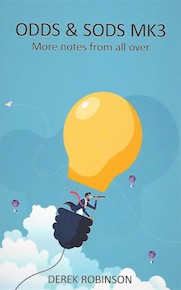 Veteran novelist Derek Robinson, the author of noted war stories and spy thrillers, is at it again, producing a third slim volume of what he calls his ‘notes from all over’ in Odds & Sods Mk3 [Whistle Books - Derek’s own company]. Veteran novelist Derek Robinson, the author of noted war stories and spy thrillers, is at it again, producing a third slim volume of what he calls his ‘notes from all over’ in Odds & Sods Mk3 [Whistle Books - Derek’s own company].
Anyone familiar with Derek’s impressive body of work over the past half-century will not be surprised to discover that many of the jottings and notes here cover the author’s specialist subjects of aviation and World War II. He treats the reader to a reappraisal of the legacy of Neville Chamberlain, the use of parachute ‘brake shutes’ on Horsa gliders on D-Day, V3 rockets, the Berlin Air Lift and the role of the Hampden bomber, along with musings on the Kennedy assassination, the human eyeball, drop-kicking in rugby and American football, the slave trade in Bristol and bull-fighting in Portugal.
All are interesting and usually served up with generous portions of acerbic wit, none more so when Robinson cites a wartime SOE agent who discouraged the use of hand guns which when ‘fired by the average person would merely be a useless noise at a range of more than a dozen yards.’ Applying this maxim to the final gunfight scene in the traditional cowboy film, Robinson advises that to be effective, the two gunfighters had to be so close they could smell each other: If you can’t tell whether the other guy is using deodorant, don’t fire a handgun. You’ll miss.
Der Schlenderner
.jpg) I am indebted, as I often am, to my South American correspondent for the information that Eric Ambler’s 1964 thriller A Kind of Anger, shown here in a Spanish edition, was turned into a West German TV movie Eine Art Von Zorn in 1984. I am indebted, as I often am, to my South American correspondent for the information that Eric Ambler’s 1964 thriller A Kind of Anger, shown here in a Spanish edition, was turned into a West German TV movie Eine Art Von Zorn in 1984.
As the film is, like West Germany, long gone, I am unlikely to ever see it unless Walter Presents trawls through the archives, but any mention of that particular Ambler title always saddens me. Back in the late 1960s I owned a small collection of Ambler paperbacks in Fontana editions with fantastic covers by designer Tom Adams. House moves and flood damage conspired to destroy my collection around 1970 but I have managed to find replacements in the subsequent half century apart from A Kind of Anger, which must be one of the most elusive paperbacks ever as I could not even find an illustration of that cover. The search continues.
Back To The Future
After two years of gruesome Zoom events and ‘blog tours’ (whatever they are) it looks like proper book launch parties are back on the agenda, at least if the recent one for Peter Morfoot’s new novel Essence of Murder [see Books of the month] in Heffers in Cambridge is anything to go by.
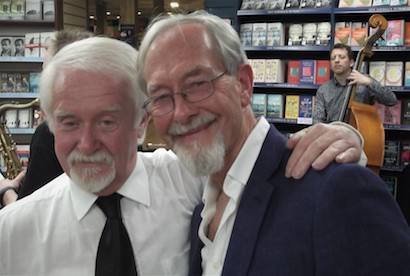
It was a pleasure to be able to congratulate Peter in person in a packed bookshop, with red wine flowing and fittingly, if you know his South of France-set detective stories, a jazz quartet performing live.
Sicilian Crime
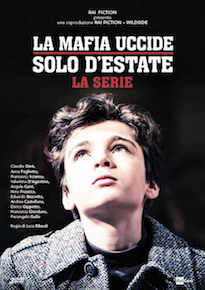 My current televisual binge watch is an utterly delightful, thoughtful and light-hearted crime drama set in sun-drenched Sicily. No, it has nobody called Montalbano; rather a family of residents of Palermo in 1979 who come to realise, mostly through the eyes of a 10-year-old boy, just how much of a grip the local mafia has on all aspects of everyday life. My current televisual binge watch is an utterly delightful, thoughtful and light-hearted crime drama set in sun-drenched Sicily. No, it has nobody called Montalbano; rather a family of residents of Palermo in 1979 who come to realise, mostly through the eyes of a 10-year-old boy, just how much of a grip the local mafia has on all aspects of everyday life.
Fortunately the Mafia only kills in summer, which happens to be the English title of La mafia uccide solo d’estate, the series being based on a film of the same name. This is a truly wondrous find, albeit four years after it was first broadcast under the Walter Presents banner on Channel 4, and thanks to the All 4 catch-up service, all 24 episodes are now available.
I cannot recommend it highly enough. There is little gore and what there is comes from actual news footage of mafia atrocities of the time, lots of humour and a nice sense of self-depreciation. For anyone trying to learn Italian, the Sicilian accents are nowhere near as difficult to follow as the Neapolitan ones in My Brilliant Friend, and for the crime buff, the plotting is superb.
No Sherlock Required
A publisher’s catalogue advertising the July publication of The Whisper House by C. S. Green, adds helpful that ‘C.S. Green is a pseudonym for...Cass Green.’
Well pardon me for thinking that it wouldn’t take a great detective to uncover that particular disguise.
Perks of the Job
Reviewers of crime fiction often get unusual incentives from publishers to make sure their novels get noticed in a very crowded market, and usually these freebies have something to do with the book there are promoting. In the past these have included chocolate bars, miniatures of bourbon and vodka, a sewing kit, a memory stick, dried fruit, a bottle of beer, real coffee and, most disturbing of all, a very real switchblade knife(!).

Slightly worrying were the goodies which accompanied my copy of Mick Herron’s Bad Actors [Baskerville], which I am sure will be a bestseller without my help though to make sure I noticed it, the publishers included a packet of popcorn and a can of alcohol-free beer. That certainly got my attention.
Fifty-Fifty
At the end of April, I reviewed my personal database of crime fiction and discovered that I had exactly 400 new titles registered for 2022. This is certainly an under-estimate, as several publishers do not tell me everything and some refuse to tell me anything. What is particularly interesting is that, on my count, 200 of the new titles (books, not eBooks, published for the first time in the UK) are by female authors, i.e. 50%, which confirms the trend of the last few years.
This trend is not completely reflected in the long lists recently announced for the 2022 Crime Writers’ Association’s Dagger Awards. By my admittedly suspect mathematics, the books on the long list for the John Creasey Award for best debut are 43% by women. [As an aside, I’d love to know how many of the candidates have ever read a John Creasey.]
For the Ian Fleming Steel Dagger for thrillers, 41% of the nominated titles are by women, and for the prestigious Gold Dagger, 35%.
Some authors are nominated on multiple lists and several have been highly praised in this very column, which is usually the kiss of death to their chances of winning. I would therefore like to issue an advance apology to S.A. Cosby (Razorblade Tears), Peter Papathanasion (The Stoning), Imran Mahmood (I Know What I Saw) and Chris Offut (The Killing Fields).
The Non-Month of Non-Fiction
I had reserved what I had hoped would be a fascinating selection of non-fiction titles to be enjoyed over the Easter period, but actually got around to none of them.

The reason for this is twofold. Firstly the lifting of the Covid moratorium on publishers’ parties and this month’s CrimeFest have limited the time available to broaden my reading experience. Secondly, there is so much good crime and thriller fiction coming out at the moment that even without a distraction into non-fiction, I have not been able to do it all justice.
I have covered as much as I could in the Books of the Month section, but some titles I had been looking forward to will have to wait. Among these, and with apologies to the authors and publishers, are: The Murder Rule by Dervla McTiernan [HarperCollins], Imposter Syndrome by Kathy Wang [Verve], The Pharmacist by Rachelle Atalla [Hodder] and Cold Reckoning by Russ Thomas [Simon & Schuster].
Legal Notice
Apologies are also due to the authors who, for legal reasons (by which I mean their publishers have cancelled me), have new books out but are not covered in this column. Among them: Sara Paretsky and Overboard [Hodder], Nicola Upson and Dear Little Corpses [Faber], Ajay Chowdhury and The Cook [Harvill] and J.G. (the author formerly known as Jim) Kelly and The Silent Child [Hodder, again].
|
|
Books of the Month
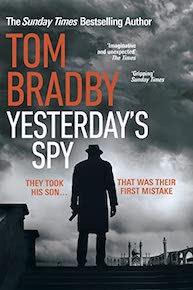
Tom Bradby’s superb new spy thriller Yesterday’s Spy [Bantam] is set in 1953 and there is a KGB mole inside the British secret service betraying operations in the Balkans resulting in dozens of deaths. I know what you’re thinking, but it’s not that straightforward. Maverick agent Harry Tower, both suspicious of and suspected by just about everybody, has to contend with the ongoing mole hunt whilst trying to find his estranged journalist son who has gone missing in Tehran, just as Iran is in political turmoil and, being oil-rich, a country of considerable interest to the major powers.
Alone and unofficially, veteran spy Harry hunts for his son in the maelstrom of Tehran as nationalist parties threaten to nationalise the country’s oil reserves and depose the Shah of Iran. A counter-coup backed by the CIA (and possibly the British and French governments?), ostensibly to counter Russian incursions, reinstates and bolsters the Shah’s regime. Blocked, threatened and having to survive several attempts to kill him, Harry has only one ally, his son’s Iranian girlfriend but can even she be trusted?
To cut through the chaos and find his son, whose left-wing investigative journalism may have uncovered some unpalatable truths, Harry resorts to violence, at which he is remarkably good. Yesterday’s Spy sets up an intriguing conundrum of both political and personal tragedy then pumps up the volume in an exhilarating, if doomed, finale.
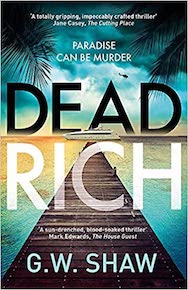
Respected crime writer William Shaw has followed the current craze of de-specifying his name and, as G.W. Shaw, has written a rip-roaring seaborne adventure thriller. He can be forgiven such name-tinkering because Dead Rich [riverrun] is absolutely terrific.
A Russian oligarch falls out of favour with the power brokers close to the Kremlin and flees with his family to the safety of his luxury super yacht currently moored in the Caribbean. The oligarch’s paranoia about personal security is well-founded because somebody is clearly out to get him and the yacht’s crew and the rather timid British musician who has been dragged along by accident. Suspicions grow and no-one seems to be trustworthy, so perhaps being out on the high seas is the safest place to be, but that is exactly where all hell breaks loose and this being the Caribbean, all collateral damage can of course be blamed on pirates...
Dead Rich provides thrills and spills in abundance, along with enough sailing lore to satisfy even the most jaded armchair admiral.
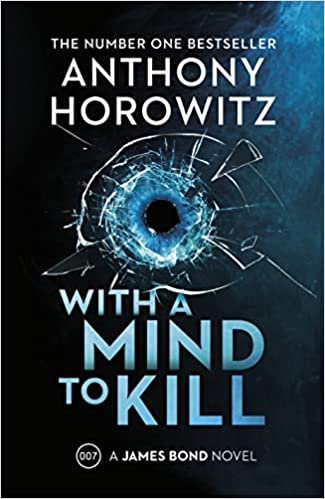
Anthony Horowitz has said that With A Mind To Kill [Jonathan Cape] will probably be his last foray into continuations of the adventures of James Bond. If it is, he will end with a flourish even if Bond does not - or does he? (No spoilers).
Set in 1964, shortly after the action in Ian Fleming’s The Man With The Golden Gun and continues one of the popular thriller tropes of the period, brainwashing (Manchurian Candidate, Ipcress File). As Bond has already been brainwashed by the KGB, he has to be de-programmed or perhaps re-programmed, in order to be sent into Russia as a triple agent to uncover a dastardly plot.
There are plenty of touches Fleming would have been proud of and some cinematic set-piece action sequences including a raid on a prison van on Tower Bridge and a fight on the Moscow underground. There is also a finale in East Berlin which pays homage to a very famous spy novel of the period.
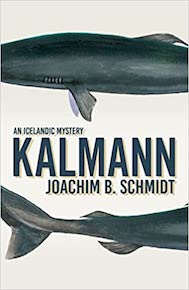
Clearly not getting enough snow and ice in his native Switzerland, in 2007 Joachim B. Schmidt made the logical choice to emigrate to Iceland, the setting for his new novel Kalmann [Bitter Lemon].
Apart from a stand-out cover showing a Greenland shark (pertinent to the plot), this ‘Icelandic mystery’ features one of the most unusual protagonists in crime fiction. Kalmann is a 33-year-old shark fisherman and Arctic fox hunter living a solitary life in a small, run down coastal village, where the locals tolerate his eccentricities and think him essentially harmless, even when he dons a cowboy hat, a tin star, toy gun and holster, and proclaims himself town sheriff.
The problem is that Kalmann, existing on junk food and daytime television, is not all that worldly; in fact decidedly removed from reality at times and prone to outbursts of violent anger. The disturbed Kalmann is therefore, probably the last person suited to play a part in the investigation into the disappearance of the town’s most important citizen, but he’s involved from the offset whether he wants to be or not.
Told from Kalmann’s mentally restricted (the locals call him ‘a retard’) viewpoint, this is no way a conventional detective story - Greenland sharks and polar bears play a part - but it is a fascinating novel about how an innocent but unsound mind processes the mysteries of everyday living (and how to talk to women) as well the effects of violent death. The story is told with pathos and much humour and a genuine sympathy for the damaged hero, not mention slipping in some satirical barbs about Icelandic attitudes to foreigners. The only thing it does not explain is why fermented, sometimes rotting, shark meat should be such an Icelandic delicacy.
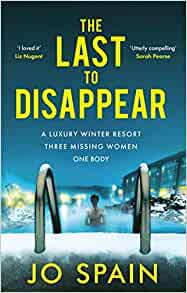
Staying with crime in a cold climate, Jo Spain’s excellent The Last To Disappear [Quercus] is set in a fancy Lapland resort in Finland which offers skimobile rides, sleigh rides, ice skating, ski-ing and other chilly activities in a small town called Koppe, which, under the surface is far from a Christmas wonderland.
When a young British girl working in the resort goes missing and turns up murdered, her slightly estranged brother turns up in Finland seeking answers and discovers that his sister is not the first young woman to go missing in Koppe in recent years. There are also plenty of locals and transient workers acting suspiciously to complicate matters, but a brave, if inexperienced local policewoman, a wonderful character, finally sorts things out.
The Last To Disappear is an exceptionally good crime novel; fluently written with some nicely-judged surprises and insights into a land of reindeer, ice sculptures, heavy drinking, casual sex and scheming local politicians, where Santa Claus is more likely to turn up in a goatskin rather than a jolly red suit.
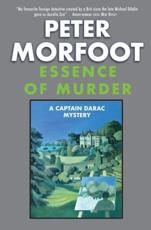
The south of France...sunshine, good food, wine, a policeman hero who is also a jazz guitarist, subsidiary cops nicknamed Bonbon and Armani, and a summer school in a villa which teaches landscape painting, wine tasting and the essence of perfumery. Oh, and there’s also a murder to solve. An ideal holiday break, plus you don’t need a passport because it’s all in Peter Morfoot’s new novel Essence Of Murder [Galileo].
This is the fourth outing for Captain Paul Darac of the Brigade Criminelle of Nice, who is described as a single-minded individualist but also a team player, a passionate rationalist, a reverent iconoclast and a walking collection of contradictions and paradoxes. As one character says: ‘If that isn’t quintessentially French, I don’t know what is.’
Peter Morfoot is holding his own in that long and distinguished line of British authors who have created fictional foreign detectives, among them Harry Keating, Nicholas Freeling, Roderic Jeffries, David Hewson and Michael Dibdin, which is good company to be in.
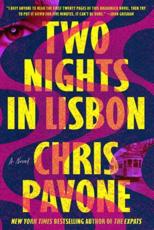
An American woman wakes up in a Lisbon hotel to find her new, second, husband not in bed beside her and in fact nowhere to be found, and for a while it appears that Two Nights In Lisbon by Chris Pavone [Head of Zeus] will be a tragic slice of domestic noir as the woman, Ariel, struggles to persuade local police and embassy officials that her husband is missing despite giving away the fact that she doesn’t known that much about him.
This could be the story of an innocent abroad, but as it progresses it is revealed - very cleverly - that Ariel perhaps isn’t as vulnerable as she seems. Then in very dramatic fashion, she receives a ransom demand for her (kidnapped?) husband, and more of his past life is revealed drip-by-drip. When the CIA get involved, Ariel could be truly out of her depth in a conspiracy which reaches to the White House, via her own troubled past.
Two Nights in Lisbon is a tense, twisty thriller, packed with lots of untrustworthy characters and cunning shifts of emphasis; a very professional piece of suspenseful crime writing.
Plot Hunting
My eyes lit up when I read a story in The Times last month which claimed that a Glaswegian ‘drugs lord’ had ‘lured a Dutch crime writer to his death outside an Amsterdam sex club.’
This was surely a plot in waiting, but on closer inspection it turned out that the ‘Dutch crime writer’ was in fact a convicted murderer who, on release from prison, had started an internet blog exposing fellow criminals and the Scottish cocaine importer (and gun runner) had set him up as a favour to another organised crime gang.
Still, powerful stuff, but not a plot I think I could handle. Over to you, Ian...
CrimeFest beckons...
The Ripster
|